We use cookies to ensure that we give you the best experience on our website. If you continue to use this site we will assume that you are happy with it
Failed Background Check After Job Offer? Do This Immediately
 Written by Background Check Repair
Written by Background Check Repair
Background Checks | May 29, 2024
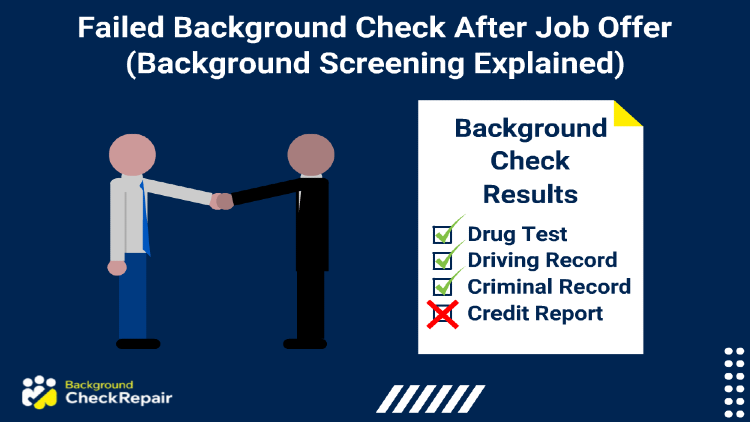
Table of Contents
If you are concerned about a failed background check after job offer, this article can help you understand what to expect with screening and how to deal with a fail. Simply put, there are steps you can take to help save the job offer but you need to act quickly; this guide will explain everything.
If you just received notice of failing the background search, there is very little time to waste. Step one is making sure they use the correct records.
Getting a job offer can be very exciting. But what happens when your potential employer tells you that they need to run a background check before officially employing you? If you are positive that your background check will come back clean, this probably won’t concern you.
However, if you are concerned about failing the background check due to a criminal history or spotty employment history, it can be a very daunting idea. In this article, we will explain what to do if you have failed a background check after a job offer.
What Is a Background Check? And What Shows Up on a Background Check?
A background check is a name-based or fingerprint-based search that can be used to determine things about your personal history. Different kinds of background investigations usually return different types of information.
You will likely need a background check if you are searching for a new job, looking to adopt a child, or searching for work in a government job. Some landlords also require a background check before renting housing.
The results of the investigation depend on the type of background check that is being used. The most popular background check for employment is a Level 1 background check. This type of background check will return criminal records from the state being searched, employment history, and a confirmation of education or licenses.1
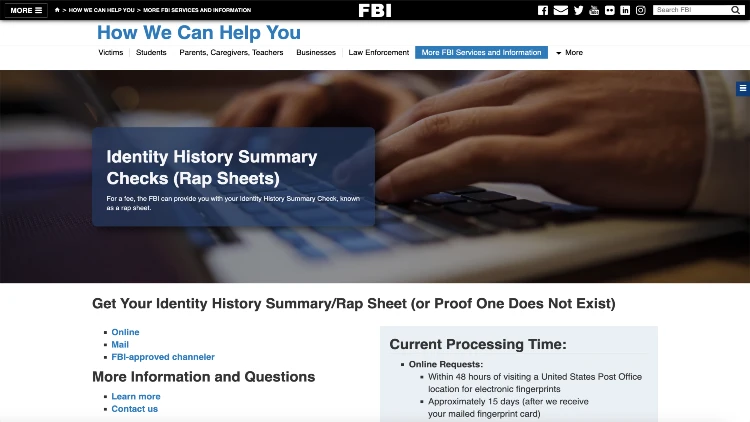
(Image: FBI5)
Other background checks such as Level 2 checks will return criminal records from a state and national level. Federal background checks or FBI background checks return federal criminal history only and are rarely used.
Will Your Criminal Record Show Up on a Background Check for Employment?
If your employer runs a name-based background check for employment, a criminal record may show up. Name-based searches typically only search a single state or local jurisdiction.
If you have a criminal record or history in the state being searched, those results will be returned. Your criminal record may also return any arrests, or dropped, or dismissed charges, depending on state law.
If you have a criminal record in a different state than the one being searched, that may not show up. Any federal crimes will also not appear, assuming that the background check is a name-based level 1 check only. Keep in mind that some serious crimes, such as kidnapping or murder, may still appear on a level 1 background check.
Will Your Credit Score and Financial Resources Show Up on Your Background Screening?
Most often, background screenings for employment will not show your credit score. When an employer is running a check on your background, it is usually done so to evaluate for a criminal record or any lies on your resume.
There are also many states that have laws against employers seeking credit information unless it’s absolutely necessary for the job’s functions, and some states prevent employers from asking about prior convictions, such as the “Ban the Box” in Oregon.4
However, some employers will request your credit information. This typically happens if you will be expected to handle a large amount of money while completing your job duties.
Credit information can also be requested by landlords who are screening for tenants. When these reports are conducted, credit information is returned, like open and closed accounts and on-time payments. If you have any outstanding debts on your credit report, these will likely also show up.
Keeping your credit information accurate will be helpful if you plan on finding a position that will involve working around finances. The Fair Credit Reporting Act outlines specific rules regarding the type of info on your report, how it can be used, as well as how to correct and update it.
What Type of Background Screening Do Employers Typically Use?
Employers typically use a level 1 background check, or an employment background check. These background checks will use your name, (sometimes) social security number, and other identifying information to return information about you.
Most employment background checks are done to determine if the applicant has a criminal history and to make sure that the history they provided is accurate. By law, you must consent to a professional check of this kind.
Most background checks are run after a position has been offered to confirm that you are a candidate.
What Does It Mean To Have a Failed Background Check? (Reasons for Failing Screening)
If you have a failed background check after job offer, it means that the employer found something in your background that disqualifies you as a competent candidate for the job in question. Depending on the job which you applied for, this could mean many different things.
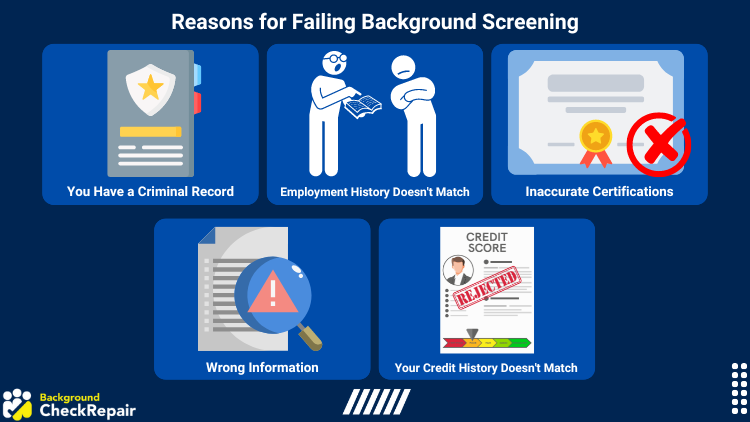
If your background includes a criminal record or a less-than-perfect credit score, your hiring employers may determine you are no longer a candidate. Lies about your employment history or education can also cause a failure.
If you or your employer make a mistake on the application, this can also cause a failed check on your background. Reasons include, but aren’t limited to:
1. You Have a Criminal Record.
Some jobs have requirements as it relates to your criminal record. These requirements often differ from job to job, but if your background screening returned facts about offenses that relate to the job, this could be considered a failure.
For example, if you were arrested for a drug charge within the last couple of years and are applying to work in a pharmacy, you would likely fail the background check. If this same drug charge was found in your application to be a tech specialist, it may not be considered a failure.
2. Your Employment History Doesn’t Match Your Claims.
If you didn’t include accurate employment history on your resume, this could cause your background check to fail. Employment history is typically verified on a background check, so any missing or incorrect information can cause an employer to think twice about hiring you for a job.
3. Your Education or Certifications Aren’t Accurate.
As with your employment history, inaccurate education or driving certifications can also be grounds for you to fail an employment background check. Lying on your resume is a big red flag for employers.
Additionally, some jobs require a certain level of education or certification status. Showing that you don’t qualify can definitely cause you to fail a background check.
4. The Information Sent In Was Inaccurate.
You could also have a failed background check after a job offer if there was incorrect information submitted, like the wrong name or date of birth, this could cause your background check to fail. If this happens, you will have an opportunity to let your employer know and dispute the results.
Unfortunately, this is one of the only reasons that you have little to no control over. Human errors can happen and, luckily, this is easily remedied by a corrected application.
5. Your Credit History Was Requested and Doesn’t Match the Job’s Qualifications.
If you are applying for a position that will require working around large amounts of money, your employer may also request a credit report. As we touched on above, this doesn’t mean that your employer will gain access to your credit score. However, they will see other things that appear on your credit report, such as late payments or large amounts of debt. If your potential employer requires that candidates have a spotless credit history, you may fail their background check.
Other reasons pertain to specific job offers, such as those related to driving or financial careers where drug offenses could disqualify you. So, it’s always a good idea to check the specific industry where you are applying to make sure that any detrimental info won’t block your efforts.
When Candidate Records Don’t Match, and Your Check Failed, What’s Next for Employment? (Understanding Adverse Action)
If you have failed a background check after job offer has already been issued, the company or person has the right to take back the offer. While they have this right, this is not always the course of action they take.
Oftentimes, the company will discuss whether or not they believe you are still able to do the job despite the background screening results. If the company does decide not to offer you employment, they are legally required to notify you.
Will Your Employer Tell You If You Get a Failed Background Check?
If you fail a background check, they are required by law to let you know. In most cases, the company will issue a pre-adverse action notice letting you know that the results have been received and they are considering whether or not to hire you based on them.3
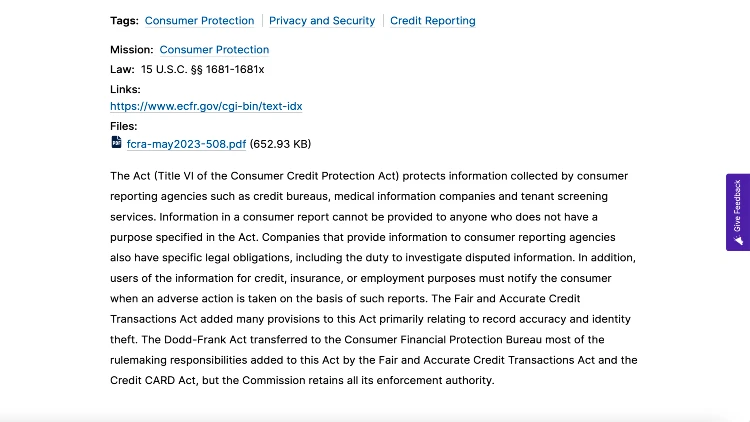
(Image: Federal Trade Commission6)
The timeline for receiving these letters will vary based on the time it takes the background screening to process and the time it takes for the employer to receive the results. Keep in mind that it can take a few days between the company’s receipt of the results and their notification to you.
If Your Background Check Fails, Can Your Employer Take an Adverse Action on You?
If your background check fails, an employer can take adverse action against you. Thanks to the Fair Credit Reporting Act (FCRA), the potential employer will need to let you know what adverse reaction they plan to take and how it relates to the background check findings.
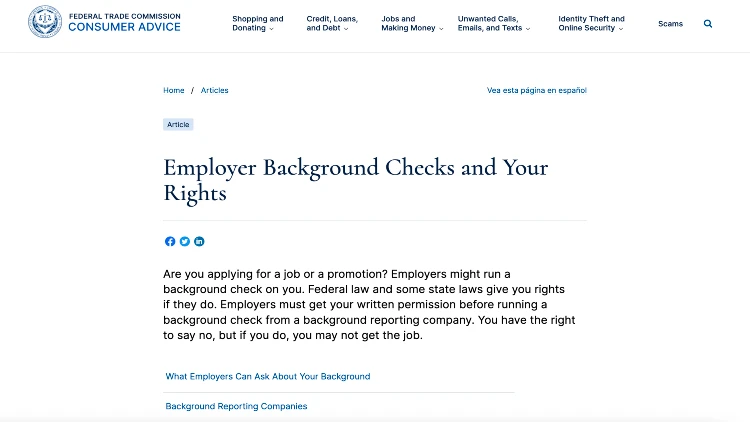
(Image: Federal Trade Commission7)
They will also be required to supply you with a copy of the failed background check and give you an opportunity to argue against any findings that aren’t accurate. If the company does not follow these steps as listed by the FCRA, you may have an opportunity to take legal action against them.2
What’s the Best Way To Avoid a Failed Background Check?
The best way to avoid a surprise failed background check is to order one for yourself prior to applying for a position of employment. Ordering a background check on yourself will help you learn exactly what other people will see. It will also give you the opportunity to fix any errors that you find.
This knowledge can also allow you to prepare an explanation for what will be found by potential future employers. When you have time to gather your thoughts, you will be more likely to honestly explain any charges or negative pieces of information during your interview for employment.
Ordering your own background check will also allow you to understand what type of jobs you will be likely to fail as a candidate. You will be able to tailor which jobs you apply for based on your history. This will give you a higher chance of being employed by a company.
What Should You Do If You Find an Error?
If you find an error on your failed background check, you should reach out to the agency that reported the charge. For example, if you find a criminal charge that should have been expunged from your record, you should get in touch with the court or law enforcement agency.
The same is true for driving violations. If you find an error on the background check after reviewing a copy of the one sent by your employer, you have time to dispute it.
When disputing an error, make sure you collect as much evidence as possible to support your argument. Simply saying something is not accurate will not be enough to remove the error.
Are There Future Consequences of a Failed Background Check?
Just because you have failed a background check for one job does not mean you will never be able to get another offer. You may not qualify to work in the same industry, but there are other options. The experience you gained during the initial failed background check will allow you to go in more prepared for the next interview.
Search for a job that will not disqualify you based on the findings of your background check. Qualifications are usually listed on the job posting, but you can always reach out to the company directly to determine your eligibility. As long as you are honest about any negative marks on your background check, you will likely find an employer who is willing to work with you.
How To Make Sure Your Job Offer Remains With the Company After a Criminal Record Check Fails
There are a few simple ways you can avoid having a failed background check and ensure that your job offer remains valid after your criminal records are searched. By following these easy ideas, you can pass an employment screening, even in many corporate positions.
1. Be Honest About Your Experience and Job Qualifications
When applying for a new job, make sure that you don’t embellish your experience to fit the job’s qualifications. When you are honest about your employment history and experience, you are one step closer to ensuring that you pass an investigation after being identified as a candidate.
2. Order and Review a Background Check on Yourself
When you order and review a background check on yourself you are giving yourself an opportunity to review what potential employers will see. Upon receiving your background check, you can look it over to make sure that the report is accurate.
If you notice any mistakes, you can remedy them before becoming a job candidate. If you find a less-than-stellar record, it will give you the opportunity to prepare for questions or concerns about it. Being prepared can make the difference in a company needing to take adverse action against you because of a failed check.
3. Come Prepared With an Explanation of Any Negative Marks on Your Report (Along With the Resources To Back It Up)
If you have successfully ordered and reviewed your own background check, you should be aware of the items on it. If you can honestly explain any of the negative marks, you may have an opportunity to avoid a background check failure.
Potential employers are more likely to look past any negative marks if they are prepared to see them on your check.
4. Go Through the Process of Expunging or Sealing Any Applicable Records
Some criminal records, such as ones that have been dismissed (like driving infractions) can be removed from your public record. You can do this by having the record expunged or sealed. In a perfect world, you will have the record expunged. This means that the record is removed from your history entirely. Unfortunately, not everyone is a candidate for this.
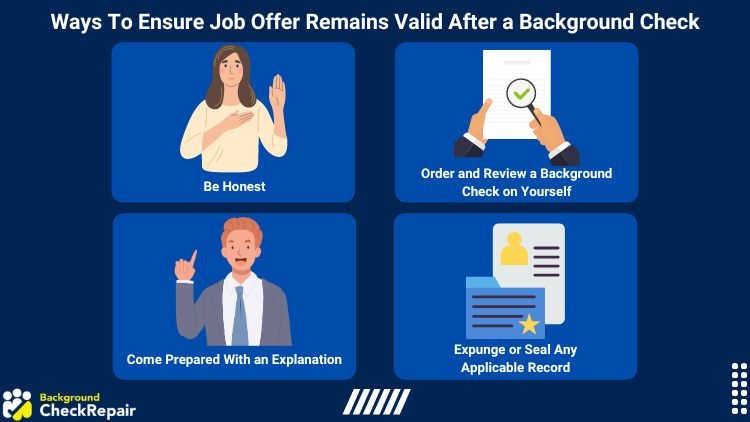
A second option is to have the record sealed. When a record is sealed, it is blocked from the view of the public. Both of these options should remove the charge from your record, making you a more appealing candidate. Keep in mind that not all records can be expunged or sealed. If you have questions about sealing or expunging a record, you should check with your state for requirements and qualifications.
There are many factors that go into a failed background check. Lying on your application, having a criminal history, having a poor credit history, or making a mistake on the background check application can all cause failures.
You can guard yourself against a background check failure by being proactive. Ordering a background check on yourself and giving yourself time to comfortably explain any negative marks will help during hiring. If you still end up with a failed background check, it is important to know that this does not mean that you won’t ever be able to find a job or be a candidate for a corporate position.
Use the information returned in a failed background check to set yourself up for a positive outcome and apply for jobs that will accept what is found. There are positions available to you that will accept any history you may have. While the idea of having a failed background check after job offer is daunting, you should know that it isn’t the end of the world, there are plenty of resources out there to overcome it.
References
1Akin, Jim. 9 July 2021. What Shows Up on a Background Check? GoodHire. 22 Oct 2021. Web. <https://www.goodhire.com/blog/what-shows-up-on-a-background-check/>
2Klazema, Michael. 16 Mar 2021. What Happens If You Fail a Background Check. BackgroundChecks.com.23 Oct 2021. Web. <https://www.backgroundchecks.com/blog/what-happens-if-you-fail-a-background-check>
3Wild, Kate. 27 April 2021. What to Do After a Failed Background Check. WikiJob. 23 Oct 2021. Web. <https://www.wikijob.co.uk/content/application-advice/job-offers/failed-background-check#what-will-the-employer-do-if-you-fail-your-background-check>
4Tavin, Andrew. 18 Mar 2021. Does Your Credit Score Show up on a Background Check?. OppU. 23 Oct 2021. Web. <https://www.opploans.com/oppu/articles/does-your-credit-score-show-up-on-a-background-check/>
5Rap Sheets (Identity History Summary Checks). Federal Bureau of Investigation. Retrieved May 29, 2024, from <https://www.fbi.gov/how-we-can-help-you/more-fbi-services-and-information/identity-history-summary-checks>
6Federal Trade Commission. 19 July 2013. Fair Credit Reporting Act. Federal Trade Commission. Retrieved May 29, 2024, from <https://www.ftc.gov/legal-library/browse/statutes/fair-credit-reporting-act>
7Federal Trade Commission. 29 Nov. 2021. Employer Background Checks and Your Rights. Federal Trade Commission. Retrieved May 29, 2024, from <https://consumer.ftc.gov/articles/employer-background-checks-your-rights>
